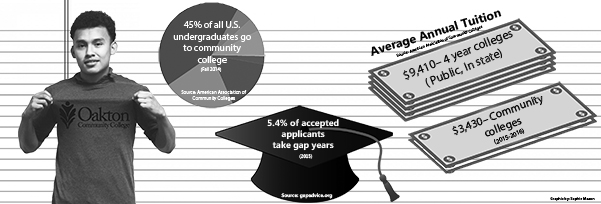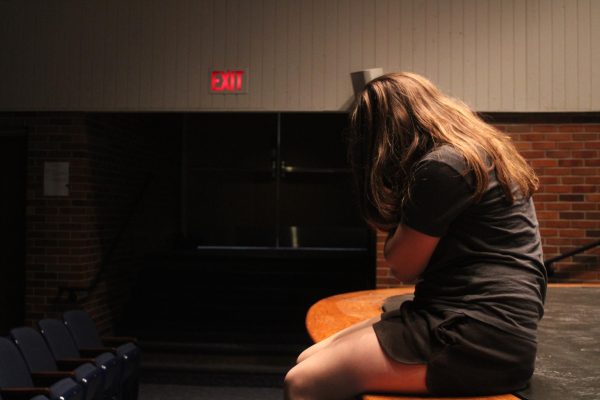“Unacceptable” post-graduation plans lead to unfair judgement
May 27, 2016
After nearly four years of high school, seniors are given the opportunity to sculpt their future through the college selection process. Most South seniors choose to attend a university while others decide to pursue alternative plans, such as attending a community college or trade school or taking a gap year.
Since a smaller proportion of graduating students prefer alternative plans in place of a four-year institution, a stigma can be observed facing those students, creating an inaccurate perception that these students lack ambition or can not get into college. In an unscientific Oracle-conducted survey of 285 South students, 77 percent believe a stigma surrounding community colleges exists.
In the Oracle’s process of collecting students’ plans for the next fall for the college map, the editorial board tends to notice that several Oakton students decline to be included, presumably due to feeling ashamed of their attendance to a community college.
The Oracle Editorial Board believes that alternate post-high school plans deserve the same respect as plans that include four-year institutions. Therefore, we urge that students resolving to undertake alternate plans be treated as such.
Social worker David Hartman said that, at least from the perspective of the administration, students are seen as equal despite their post-high school decisions. He believes it is ultimately up to the student, not what society expects of them.
“For most of the teachers I know and for sure all of the clinicians I know, […] we don’t value [differing priorities],” Hartman said. “What we do is look to [each individual] and ask what’s the best for them.”
However, accepting and eliminating the stigma is easier said than done as group effort is required to do so. According to Hartman, students are societally expected to attend college after high school. Because of this idea, he believes that students who don’t have the opportunity to go to college or decide not to attend are perceived to have a lack of ambition.
“In our community, there’s a presumption that [college] is what’s next,” Hartman said. “The frank answer is that’s not what’s next for some kids. Whether that’s because of a disability or because of maturity or because of finances or because of other reasons I can’t even think of, there are lots of different reasons why college isn’t next for some kids.”
Financial reasons
Several students choose to attend community colleges, Oakton Community College being the most popular choice among South students (see the college map page 12-13), for the first two years after high school. This usually allows for students to get their General Education courses fulfilled early and then transfer to a larger institution to focus on their major for the next two years.
Soju Kunchandy, South alumnus and current Oakton student, chose Oakton for the long-term financial benefits.
“When I first started [looking at colleges], I didn’t want to go [to] Oakton just because I wanted that college experience, but at the same time, I knew it was a smart financial move,” Kunchandy said.
The Oracle Editorial Board would also like to address that regardless of college qualifications, financial needs sometime take precedence over one’s academic ambitions. Kunchandy agrees with this point based on the diversity of people he has met at Oakton.
Kunchandy recalls a student he knew who was accepted into the University of Chicago but did not attend because of financial reasons. This is a prime example of why the stigma of students going to community college due to lack of intelligence is inaccurate.
While Kunchandy does believe there is a stigma present, he feels it is slowly changing because more students are attending community college due to the large expenses of four-year institutions. A year of classes at Oakton tends to cost about $8,065, while a year at University of Illinois at Urbana-Champaign, for example, can cost up to $30,330 for an Illinois resident, according to collegedata.com.
Compatibility with educational system
Albert Einstein and Thomas Edison are famous for their brilliant minds yet in school, they were relatively unsuccessful. The Oracle Editorial Board would like to argue that some students may learn better outside of the rigid school system we are familiar with, as the aforementioned famous individuals did.
According to Daniel Zapler, teacher of the Issues and Answers Philosophy class, he feels some brilliant students may have the misperception that they are unintelligent if they are unsuccessful in things such as writing essays or multiple choice exams.
Zapler also believes that if a student chooses to not proceed onto a college or university and instead start living in the ‘real world’, they are thrown into real-life experiences with obstacles they must learn to overcome. The Editorial Board would like to point out that this form of learning can be more effective for some as it would force one to take risks and face failures, which Zapler argues students are taught to avoid.
Travelling and Service
In reference to students taking gap years, some resort to this alternative plan in order to take advantage of the year off from school. Many use this time to work and save money for college, discover their passions or gain worldly experience through travelling. Contrary to some beliefs, students use their gap year to do more than just sit.
South graduate Madison O’Brien spent her gap year travelling the Eastern Hemisphere. For three months in Zambia, she taught and worked with native children. She then spent five months in South America, which consisted of backpacking in Argentina, Chile and Peru for two months and volunteering in the Amazon rainforest. She concluded her travels by spending a month in Colombia.
In the fall, O’Brien plans to attend McGill University in Montreal, Canada. According to O’Brien, taking a gap year provided her the necessary freedom to find herself and discover her passions. However, this came at the cost of straying from the expected high school to college transition.
“I decided to take a gap year because I love to travel, and I didn’t want to wait to see the world,” O’Brien said. “For me, school could wait. It seemed only fair that, after 12 years of classrooms and studying and stress, I could take a year to myself and get away from all of that. Unfortunately, not all people look at it that way. Especially graduating from a place like South – where over 95 percent of graduates attend college straight away – what I did was definitely out of the norm.”
O’Brien said that she was affected by the stigma pinned against students that don’t go straight to university after high school. Amidst all of her peers choosing colleges to attend, she began to waver in her decision to travel instead of going to school. With a stigma having such a powerful influence to almost stop a student from pursuing their dream, the Oracle Editorial believes that we as a community need to work collectively to end the stigma created simply because gap years deviate from the norm.
“I remember thinking that I was making the wrong decision, since so few were making it with me,” O’Brien said. “My close friends and family were always really supportive, but I could tell that some of my parents’ friends and some of my relatives thought I was crazy. […] It’s ridiculous how many people think that those who take gap years are ‘just not ready for college’. The amount of times people asked me, ‘Why?’ was crazy. The real question should be, ‘Why not?’”












